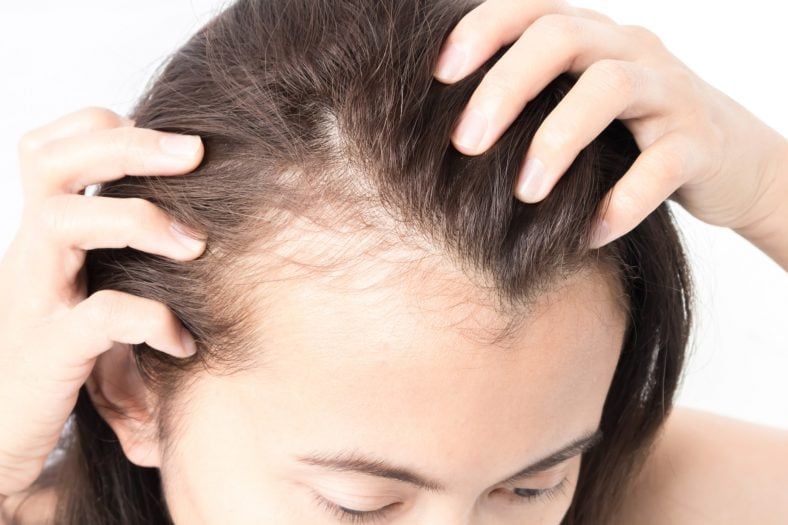5 Major Causes of Hair Loss

Table of Contents
About 40% of women experience significant hair loss by age 40. This problem is even more common among men. Its causes range from certain medications and health conditions to genetics. Laser therapy and hair transplant surgery, two popular hair restoration options, can run into thousands. Plus, no one can guarantee their long-term efficiency.
The best treatment for hair loss depends on what’s causing this problem in the first place. If, say, your hair is falling out because of nutrient deficiencies, then you may need to tweak your diet. Small changes, such as getting more biotin and vitamin D, can make all the difference.
Interested to find out more? Here’s what you should know about the primary causes of hair loss before seeking treatment.
How Much Hair Loss Is Normal?
First of all, make sure you actually need treatment for hair loss.
The average person loses about 50 to 100 hairs per day, which is perfectly normal.
Stress, childbirth, weight loss, and other factors may cause excessive hair shedding. This condition usually goes away within months. However, if you’re constantly stressed, you may experience hair shedding for a longer time.
Hair loss, on the other hand, occurs when your hair stops growing. It can be due to genetics, thyroid disease, autoimmune disorders, and other factors. Excessive heat styling may result in hair loss, too.
Sometimes, hair loss stops on its own. For example, if you have an overactive thyroid and start taking medications to control its symptoms, your hair should grow back. Other conditions, such as alopecia, may require specialized treatment.
Now that you know more about hair loss and how it differs from hair shedding, read on to learn about its causes.
1. Alopecia Areata
One of the most common causes of hair loss is alopecia areata. This autoimmune disease affects nearly seven million Americans and 147 million people worldwide.
Hair loss symptoms due to alopecia include small bald spots on the scalp and other areas of the body. Sufferers may also experience nail pitting and breakage, bald patches in the beard area, and loss of eyelashes.
When you have this disease, your immune system attacks the hair follicles. As a result, your hair starts to fall out. Certain factors, such as thyroid disease and vitamin D deficiency may increase the risk of alopecia.
While it’s possible to get this disease at any age, most people develop it by age 30. Treatment depends on your age, symptoms, and affected areas.
2. Pattern Hair Loss
Androgenic alopecia, or pattern hair loss, affects both men and women. Researchers believe that it’s due to a combination of hereditary, hormonal, and environmental factors.
This condition typically occurs in adulthood, but it can also develop during your teenage years. In the first few years, you may experience hair loss at the temples or individual bald spots. Another common symptom is a receding hairline forming an M shape.
Depending on the severity of hair loss, you may opt for wigs and hairpieces or undergo medical treatment. Hair transplants are only recommended in extreme cases. This hair restoration method is expensive and may result in scars or infections.
Research your options before resorting to a hair transplant. RegenRx RU-58841 and other topical products are much safer than medications and surgery. These formulas nourish your scalp and stimulate the hair follicles, restoring your hair.
3. Nutrient Deficiencies
There’s a reason why hair growth supplements contain large doses of biotin, folic acid, zinc, and other key nutrients. These vitamins and minerals nourish your hair and prevent it from falling out.
What you eat has a direct impact on the health of your skin, hair, and nails. Certain nutrients, such as protein and biotin, are particularly important for hair growth. The same goes for omega-3s, vitamin A, vitamin C, and selenium.
For example, it’s common to experience hair loss while on a diet. That’s why nutritionists recommend eating plenty of protein, fresh fruits, vegetables, nuts, and seeds.
Biotin, for instance, stimulates follicle growth and makes your hair stronger. The recommended daily amount is at least 30 micrograms per day. This B vitamin occurs naturally in nuts, seeds, legumes, seafood, whole grains, and soy products.
Make sure your diet also provides adequate amounts of iron. People with iron deficiency are more likely to experience hair loss. You can obtain this mineral from red meat, soybean flour, dried fruits, beans, spinach, and quinoa.
4. Hormonal Imbalances
Hair loss may also occur because of hormonal imbalances. That’s why it often affects women after childbirth. In one study, nearly 90% of female subjects experienced hair loss within eight to 16 weeks after delivery.
Thyroid disease and other conditions that affect hormone levels may cause hair loss, too. Both hypothyroidism and hyperthyroidism have this side effect.
In such cases, it’s important to address the root cause of hair loss. Your doctor may recommend blood tests to check your hormone levels and decide on the best course of action.
5. Stress, a Major Risk Factor for Hair Loss
Prolonged or chronic stress and hair loss are strongly connected. This lifestyle factor may cause the hair follicles to enter a resting phase, leading to excessive hair shedding or alopecia.
Stress also affects your hormone levels, immune function, and eating habits, which may worsen hair loss. If you have a thyroid condition, stress can aggravate its symptoms.
Choose a Hair Restoration Solution That Works
There is no one-size-fits-all solution when it comes to hair loss. Prescription drugs are often ineffective and have severe side effects. More invasive treatments, such as surgery, require multiple sessions and come with a high price tag.
RegenRx offers topical products that only stop hair loss but also stimulate hair growth and nourish the scalp. Our formulas are fast-drying and absorb quickly into the hair. Plus, they have none of the side effects of prescription meds.
Don’t take unnecessary risks. Try our hair restoration solutions today! Your future self will thank you.